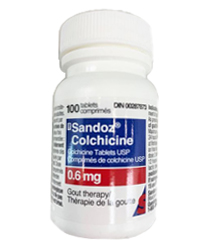What is Colchicine used for?
Colchicine is prescribed to treat or prevent gout attacks. These attacks are characterized by a sudden and severe pain in your joints caused by abnormally high levels of uric acid in the blood. This happens when uric acid causes inflammation (pain, redness,swelling and heat) in the joint. Colchicine is not a cure but should prevent gout attacks when taken regularly. While it will prevent the pain associated with gout it can not resolve other types of pain.
It’s important to follow your doctor’s recommendations when taking colchicine. You either need to take a small amount every day consistently, or a larger amount within a few hours to relieve a gout attack that is ongoing. Following the doctor’s recommendations will make sure this medication works optimally. Some of the side effects can be severe. It is important to consult with your doctor to make sure that the benefits outweigh the potential risks. Please select appropriate strength from below to buy Colchicine online.
Colchicine (Myinfla ER) FAQs
How To Use Colchicine?
Colchicine tablets are taken once or twice a day depending on your doctor’s instructions. It may be taken with or without food. Generally it is taken once or twice a day to prevent gout or FMF (Familial Mediterranean Fever). If you are taking this to manage a gout attack in progress, make sure you take the medication at the onset. The commonly suggested dose is 1.2 milligrams at the onset of the attack, accompanied by 0.6 milligrams an hour later. The maximum suggested dose is 1.8 milligrams taken over a 1-hour period. If you do have a gout attack make sure to check with your doctor to make sure this treatment is tenable. Do not take more than what is recommended by your doctor as this may increase the risk and severity of side effects. Please select appropriate strength from above to buy Colchicine online.
Colchicine Side Effects
Most common:
- Diarrhea
- stomach pain
- Vomiting
- nausea
Less Common:
- swelling
- fever with or without chills
- headache
- blood in the urine or stools
- skin rash or hives
- peeling of the skin
- redness of the skin
- numbness in the fingers or toes (usually mild)
- unusual bleeding or bruising
- pain
- pinpoint red spots on the skin
- sore throat
- large, hive-like swellings on the face, eyelids, mouth, lips, or tongue
- tenderness
- sores, ulcers, or white spots on the lips or in the mouth
- burning, “crawling”, or tingling feeling in the skin
- difficulty with breathing when exercising
- unusual tiredness or weakness
- Black, tarry stools
- muscle weakness
Signs of overdose
- irregular, fast, slow, or shallow breathing
- unusual tiredness
- confusion
- cold, clammy, pale skin
- nausea, stomach pain, or vomiting (severe)
- slow heart rate
- dizziness
- Bleeding
- seizures
- irregular heartbeat
- fever
- eye pain
- headache
- cough
- diarrhea (severe or bloody)
- general feeling of illness
- burning feeling in the stomach, throat, or skin
- chills
- sore throat
- chest pain or discomfort
- muscle weakness (very severe)
This is not an exhaustive list of potential side effects when taking Colchicine. Be sure to make sure you are aware of these when consulting with a doctor or pharmacist
Colchicine Drug Interactions
- Verapamil
- Ranolazine
- Nefazodone
- Fibrates such as bezafibrate, fenofibrate
- Cholesterol-lowering medications such as atorvastatin (Lipitor), fluvastatin (Lescol), lovastatin (Mevacor), pravastatin (Pravachol), and simvastatin (Zocor)
- Antibiotics such as azithromycin (Zithromax), clarithromycin (Biaxin), erythromycin (E.E.S., E-Mycin), and telithromycin (Ketek)
- Antifungals such as fluconazole (Diflucan), itraconazole (Sporanox), and ketoconazole (Nizoral)
- Cyclosporine (Gengraf, Neoral, Sandimmune)
- Medications for HIV or AIDS such as amprenavir (Agenerase), atazanavir (Reyataz), fosamprenavir (Lexiva), indinavir (Crixivan), nelfinavir (Viracept), ritonavir (in Kaletra, Norvir), and saquinavir (Invirase)
- Diltiazem (Cardizem, Dilacor, Tiazac, others)
- Digoxin (Digitek, Lanoxin)
- Aprepitant (Emend)
There may be more interactions with this drug that are not included in this list. Be sure to go over your medications with your doctor or pharmacist before you begin taking this medication
Do I need a prescription to buy colchicine?
Yes, this medication requires a prescription.
How long should I take colchicine?
As long and directed by your doctor.
Does colchicine work the same way as other pain relievers?
It does not. This is not meant to be used to replace other pain medications or treat anything but gout or FMF.
Does colchicine work the same way as other pain relievers?
It does not. This is not meant to be used to replace other pain medications or treat anything but gout or FMF.
